Related Research Articles
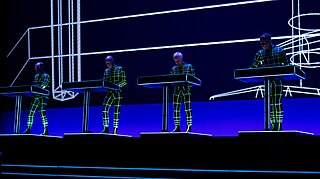
Kraftwerk are a German electronic band formed in Düsseldorf in 1970 by Ralf Hütter and Florian Schneider. Widely considered innovators and pioneers of electronic music, Kraftwerk were among the first successful acts to popularize the genre. The group began as part of West Germany's experimental krautrock scene in the early 1970s before fully embracing electronic instrumentation, including synthesizers, drum machines, and vocoders. Wolfgang Flür joined the band in 1973 and Karl Bartos in 1975, expanding the band to a quartet.

Autobahn is the fourth studio album by German electronic music band Kraftwerk, released in November 1974 by Philips Records. The album marked several personnel changes in the band, which was initially a duo consisting of Florian Schneider and Ralf Hütter; later, the group added Klaus Röder on guitar and flute, and Wolfgang Flür on percussion. The album also completed the group's transition from the experimental krautrock style of their earlier work to an electronic pop sound consisting mostly of synthesizers and drum machines. Recording started at the group's own Kling Klang facility, but was predominantly made at Conny Plank's studio. Autobahn also includes lyrics and a new look for the group that was suggested by Emil Schult, an associate of Schneider and Hütter.

John Douglas "Jon" Lord was an English keyboardist and composer. In 1968, Lord co-founded the hard rock band Deep Purple. Lord performed on most of the band's most popular songs; he and drummer Ian Paice were the only continuous members in the band between 1968 and 1976, and also from its revival in 1984 until his retirement in 2002. He also played for the bands Whitesnake, Paice Ashton Lord, the Artwoods, the Flower Pot Men and Santa Barbara Machine Head.
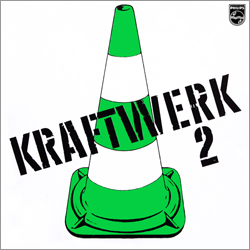
Kraftwerk 2 is the second studio album by German electronic band Kraftwerk, released in January 1972.

Florian Schneider-Esleben was a German musician. He is best known as one of the founding members and leaders of the electronic band Kraftwerk, performing his role with the band until his departure in 2008.

Replicas is the second and final studio album by the English new wave band Tubeway Army, released on 6 April 1979 by Beggars Banquet Records. It followed their self-titled debut from the previous year. After this, Tubeway Army frontman Gary Numan would continue to release records under his own name, though the musicians in Tubeway Army would continue to work with him for some time. Replicas was the first album of what Numan later termed the "machine" phase of his career, preceding The Pleasure Principle (1979) and Telekon (1980), a collection linked by common themes of a dystopian science fiction future and transmutation of man/machine, coupled with an androgynous image and a synthetic rock sound.

Self Portrait is the tenth studio album by the American singer-songwriter Bob Dylan, released on June 8, 1970, by Columbia Records.

Mogwai are a Scottish post-rock band, formed in 1995 in Glasgow. The band consists of Stuart Braithwaite, Barry Burns, Dominic Aitchison, and Martin Bulloch (drums). Mogwai typically compose lengthy guitar-based instrumental pieces that feature dynamic contrast, melodic bass guitar lines, and heavy use of distortion and effects.

Annuals is the musical project of the American singer, songwriter, producer, and multi-instrumentalist, Adam Baker. Founded in Raleigh, North Carolina, United States in 2003, Annuals first found success following its critically acclaimed 2006 release, Be He Me. As of September 2013, Annuals is based out of Los Angeles.
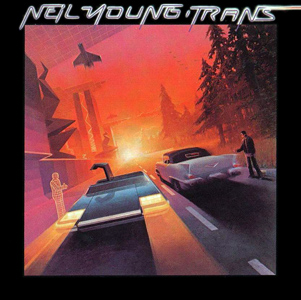
Trans is the thirteenth studio album by Canadian-American musician and singer-songwriter Neil Young, released on January 10, 1983. Recorded and released during his Geffen era in the 1980s, its electronic sound baffled many fans upon its initial release—a Sennheiser vocoder VSM201 features prominently in six of the nine tracks.
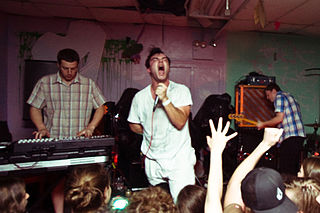
Future Islands is an American synth-pop band based in Baltimore, Maryland, comprising Gerrit Welmers, William Cashion, Samuel T. Herring, and Michael Lowry (percussion). The band was formed in January 2006 by Welmers, Cashion and Herring—the remaining members of the performance art college band Art Lord & the Self-Portraits—and drummer Erick Murillo.

Bromst is the second studio album by the American electronic musician Dan Deacon. It was released on March 24, 2009.
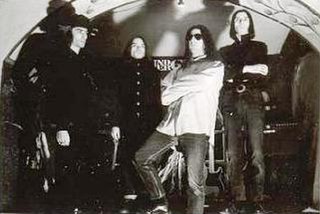
Trivalia was a Serbian and Yugoslav gothic rock/industrial band formed in Niš in 1986. Led by vocalist and principal songwriter Vladimir Žikić "Mantis", Trivalia combined gothic rock, industrial music and darkwave with influences of Byzantine music and other musical genres.
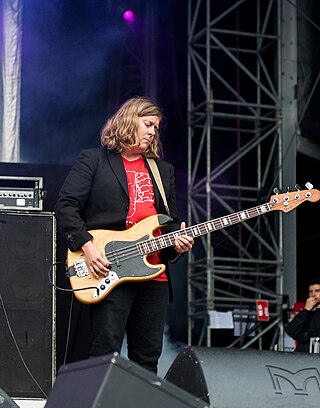
Peals is an American instrumental duo from Baltimore, Maryland, formed in early 2012 and composed of William Cashion and Bruce Willen. The two bass players of the Baltimore bands Future Islands and Double Dagger respectively, left bass, computer and drums aside to incorporate elements of ambient, folk, krautrock, punk, and experimental music into their project.

In Evening Air is the second album by American synth-pop band Future Islands, released on May 4, 2010, by Thrill Jockey records. It is titled after a poem of the same name by Theodore Roethke from his final collection, The Far Field. The album art was produced by former band member Kymia Nawabi.

Samuel Thompson Herring, also known as Hemlock Ernst, is an American singer, rapper and actor based in Baltimore, Maryland. He is best known as the frontman of the synth-pop band Future Islands, with whom he has recorded seven studio albums. He has also previously been a member of Art Lord & the Self-Portraits, The Snails, and Trouble Knows Me.
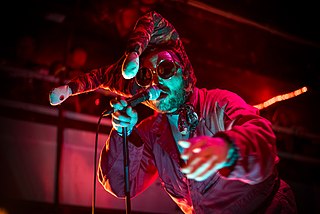
The Snails is an American rock band with touches of post-punk, ska and reggae, based in Baltimore, Maryland. It is currently composed of Sandy Snailbelow, Snailliam, Sammy Snail, Snailburne, Snailbraham, Snailrell and Snailpril. As snails, they live in a Shoebox, where they like to play basketball.

American synthpop band Future Islands have released seven studio albums, six extended plays (EPs), 23 singles and 15 music videos. Future Islands was formed in Greenville, North Carolina but relocated to Baltimore, Maryland in 2008. It consists of John Gerrit Welmers (keyboards), William H. Cashion, and Samuel T. Herring (vocals). The band included Erick Murillo (drums) up until November 2007.

As Long as You Are is the sixth studio album by American synth-pop band Future Islands, released on October 9, 2020. The album was the first to feature Michael Lowry as proper member of the band, after previously serving as their touring drummer since 2014.

People Who Aren't There Anymore is the seventh studio album by American synth-pop band Future Islands, released on January 26, 2024, by 4AD. Their fourth release on the label, the album was produced by the band and previous collaborator Steve Wright, who shared mixing duties with Chris Coady, the producer of the band's fourth album, Singles (2014).
References
- ↑ Snow, Hilary (February 23, 2006). "Synth-rockers Art Lord evolve into Future Islands". starnewsonline.com. Star News Online. Retrieved May 4, 2017.
- ↑ Stamp, Tony (April 6, 2017). "The past and present of Future Islands". thewireless.co.nz. The Wireless. Retrieved April 14, 2017.
- 1 2 Grant, Sarah (April 10, 2017). "Future Islands: The Unlikely Rise of Baltimore's Heartache Kings". rollingstone.com. Rolling Stone. Retrieved April 15, 2017.
- 1 2 3 Brandon Weigel (November 2, 2011). "A rising Baltimore band takes success personally". citypaper.com. Baltimore City Paper. Retrieved April 16, 2017.
- 1 2 3 4 5 6 7 8 Studarus, Laura (September 24, 2014). "Future Islands on Their Childhoods, First Broken Hearts, The Band's Early Days, and Their Fans". undertheradarmag.com. Under the Radar Magazine (Published on paper Issue #50 - June/July 2014 - Future Islands). Retrieved April 16, 2017.
- 1 2 3 4 Studarus, Laura (September 23, 2014). "Future Islands - The Under the Radar Cover Story". undertheradarmag.com. Under the Radar Magazine. Retrieved April 16, 2017.
- ↑ Corbie Hill (March 26, 2014). "Future Islands' international star is rising, but their roots run back to North Carolina". indyweek.co. Indy Week. Retrieved April 18, 2017.
- 1 2 Yale, Brett (January 11, 2013). "Art Lord & the Self-Portraits". imposemagazine.com. Impose Magazine. Retrieved April 16, 2017.
- ↑ BMore Music (October 18, 2012). "Interview: Art Lord: A synopsis by Sam Herring". bmoremusic.tumblr.com. BMore Music. Retrieved April 16, 2017.
- 1 2 Chris Powers (February 13, 2013). "Q&A with Art Lord & The Self Portraits". dailytarheel.com. Daily Tarheel. Retrieved April 16, 2017.
- 1 2 Snow, Hilary (January 13, 2005). "Art imitating life: The weird, wonderful world of Art Lord and the Self Portraits". starnewsonline.com. Star News Online. Retrieved April 16, 2017.
- 1 2 3 Hill, Corbie (January 11, 2013). "Future Islands precursors Art Lord and the Self-Portraits release a new master of an old song". indyweek.com. IndyWeek. Retrieved April 16, 2017.
- ↑ Zach Moldof (February 18, 2015). "Days of Future Islands Past". noisey.vice.com. Noisey, Music by Vice. Retrieved April 14, 2017.
- ↑ Blagburn, Francis (March 1, 2017). "Yours Sincerely, Future Islands". crackmagazine.net. Crack Magazine. Retrieved April 14, 2017.
- 1 2 3 Siobhán Kane (October 12, 2010). "Words with Future Islands". thumped.com. Thumped. Retrieved April 13, 2017.
- 1 2 3 4 Hill, Corbie (February 13, 2013). "The brief reunion of Art Lord & the Self-Portraits offers a glimpse into Greenville's former college-rock crucible". indyweek.com. IndyWeek. Retrieved April 16, 2017.
- ↑ Weekes, Jabbari (7 July 2014). "Future Islands talk alter egos, the Smashing Pumpkins, and the upside to being sad". www.aux.tv. AUX Music Network. Archived from the original on 8 December 2015. Retrieved 22 November 2015.
- ↑ Jedidiah (September 21, 2011). "Dan Deacon and Wham City Comedy Tour Coming to Kings Barcade". newraleigh.com. New Raleigh. Retrieved April 16, 2017.
- ↑ Katherine Coplen (November 14, 2012). "Breaking up with Future Islands". nuvo.net/. Nuvo. Retrieved April 16, 2017.
- ↑ Jim Caroll (November 27, 2014). "Future Islands: 'We were seen as jokers'". irishtimes.com. Irish Times. Retrieved April 16, 2017.
- ↑ Kyle Petersen (March 16, 2014). "Future Islands members goof off with friends in the Snails". charlestoncitypaper.com. Charleston Citypaper. Retrieved April 18, 2017.
- ↑ Cyclone Wehner (October 12, 2015). "Future Islands Chat To Us About Upcoming Aus Tour & When To Expect New Music". musicfeeds.com.au. Music Feeds. Retrieved April 15, 2017.
- ↑ James Scherer (September 13, 2016). "Defining fame with Future Islands". smilepolitely.com. Smile Politely. Retrieved April 15, 2017.